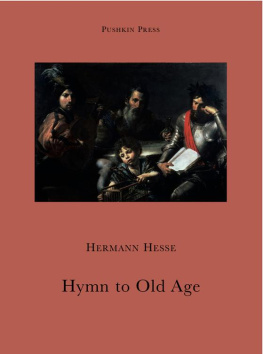
The author and publisher have provided this e-book to you for your personal use only. You may not make this e-book publicly available in any way. Copyright infringement is against the law. If you believe the copy of this e-book you are reading infringes on the authors copyright, please notify the publisher at: us.macmillanusa.com/piracy.
Contents
AUTHORS NOTE 1961
Poetic writing can be understood and misunderstood in many ways. In most cases the author is not the right authority to decide on where the reader ceases to understand and the misunderstanding begins. Many an author has found readers to whom his work seemed more lucid than it was to himself. Moreover, misunderstandings may be fruitful under certain circumstances.
Yet it seems to me that of all my books Steppenwolf is the one that was more often and more violently misunderstood than any other, and frequently it is actually the affirmative and enthusiastic readers, rather than those who rejected the book, who have reacted to it oddly. Partly, but only partly, this may occur so frequently by reason of the fact that this book, written when I was fifty years old and dealing, as it does, with the problems of that age, often fell into the hands of very young readers.
But among readers of my own age I also repeatedly found some whothough they were impressed by the bookstrangely enough perceived only half of what I intended. These readers, it seems to me, have recognized themselves in the Steppenwolf, identified themselves with him, suffered his griefs, and dreamed his dreams; but they have overlooked the fact that this book knows of and speaks about other things besides Harry Haller and his difficulties, about a second, higher, indestructible world beyond the Steppenwolf and his problematic life. The Treatise and all those spots in the book dealing with matters of the spirit, of the arts and the immortal men oppose the Steppenwolfs world of suffering with a positive, serene, super-personal and timeless world of faith. This book, no doubt, tells of griefs and needs; still it is not a book of a man despairing, but of a man believing.
Of course, I neither can nor intend to tell my readers how they ought to understand my tale. May everyone find in it what strikes a chord in him and is of some use to him! But I would be happy if many of them were to realize that the story of the Steppenwolf pictures a disease and crisisbut not one leading to death and destruction, on the contrary: to healing.
Hermann Hesse
A NOTE ON THE TRANSLATION 1963
This is the first revised edition of Basil Creightons translation of 1929. In the revision we were intent upon a more exact and more readily understood rendition. British spellings and idioms have been Americanized, Germanisms removed, awkward sentences improved, and misleading translations corrected.
Joseph Mileck
Horst Frenz
PREFACE
T HIS BOOK CONTAINS THE RECORDS left us by a man whom, according to the expression he often used himself, we called the Steppenwolf. Whether this manuscript needs any introductory remarks may be open to question. I, however, feel the need of adding a few pages to those of the Steppenwolf in which I try to record my recollections of him. What I know of him is little enough. Indeed, of his past life and origins I know nothing at all. Yet the impression left by his personality has remained, in spite of all, a deep and sympathetic one.
Some years ago the Steppenwolf, who was then approaching fifty, called on my aunt to inquire for a furnished room. He took the attic room on the top floor and the bedroom next it, returned a day or two later with two trunks and a big case of books and stayed nine or ten months with us. He lived by himself very quietly, and but for the fact that our bedrooms were next door to each otherwhich occasioned a good many chance encounters on the stairs and in the passagewe should have remained practically unacquainted. For he was not a sociable man. Indeed, he was unsociable to a degree I had never before experienced in anybody. He was, in fact, as he called himself, a real wolf of the Steppes, a strange, wild, shyvery shybeing from another world than mine. How deep the loneliness into which his life had drifted on account of his disposition and destiny and how consciously he accepted this loneliness as his destiny, I certainly did not know until I read the records he left behind him. Yet, before that, from our occasional talks and encounters, I became gradually acquainted with him, and I found that the portrait in his records was in substantial agreement with the paler and less complete one that our personal acquaintance had given me.
By chance I was there at the very moment when the Steppenwolf entered our house for the first time and became my aunts lodger. He came at noon. The table had not been cleared and I still had half an hour before going back to the office. I have never forgotten the odd and very conflicting impressions he made on me at this first encounter. He came through the glazed door, having just rung the bell, and my aunt asked him in the dim light of the hall what he wanted. The Steppenwolf, however, first threw up his sharp, closely cropped head and sniffed around nervously before he either made any answer or announced his name.
Oh, it smells good here, he said, and at that he smiled and my aunt smiled too. For my part, I found this manner of introducing himself ridiculous and was not favorably impressed.
However, said he, Ive come about the room you have to let.
I did not get a good look at him until we were all three on our way up to the top floor. Though not very big, he had the bearing of a big man. He wore a fashionable and comfortable winter overcoat and he was well, though carelessly, dressed, clean-shaven, and his cropped head showed here and there a streak of grey. He carried himself in a way I did not at all like at first. There was something weary and undecided about it that did not go with his keen and striking profile nor with the tone of his voice. Later, I found out that his health was poor and that walking tired him. With a peculiar smileat that time equally unpleasant to mehe contemplated the stairs, the walls, and windows, and the tall old cupboards on the staircase. All this seemed to please and at the same time to amuse him. Altogether he gave the impression of having come out of an alien world, from another continent perhaps. He found it all very charming and a little odd. I cannot deny that he was polite, even friendly. He agreed at once and without objection to the terms for lodging and breakfast and so forth, and yet about the whole man there was a foreign and, as I chose to think, disagreeable or hostile atmosphere. He took the room and the bedroom too, listened attentively and amiably to all he was told about the heating, the water, the service and the rules of the household, agreed to everything, offered at once to pay a sum in advanceand yet he seemed at the same time to be outside it all, to find it comic to be doing as he did and not to take it seriously. It was as though it were a very odd and new experience for him, occupied as he was with quite other concerns, to be renting a room and talking to people in German. Such more or less was my impression, and it would certainly not have been a good one if it had not been revised and corrected by many small instances. Above all, his face pleased me from the first, in spite of the foreign air it had. It was a rather original face and perhaps a sad one, but alert, thoughtful, strongly marked and highly intellectual. And then, to reconcile me further, there was his polite and friendly manner, which though it seemed to cost him some pains, was all the same quite without pretension; on the contrary, there was something almost touching, imploring in it. The explanation of it I found later, but it disposed me at once in his favor.
Next page












